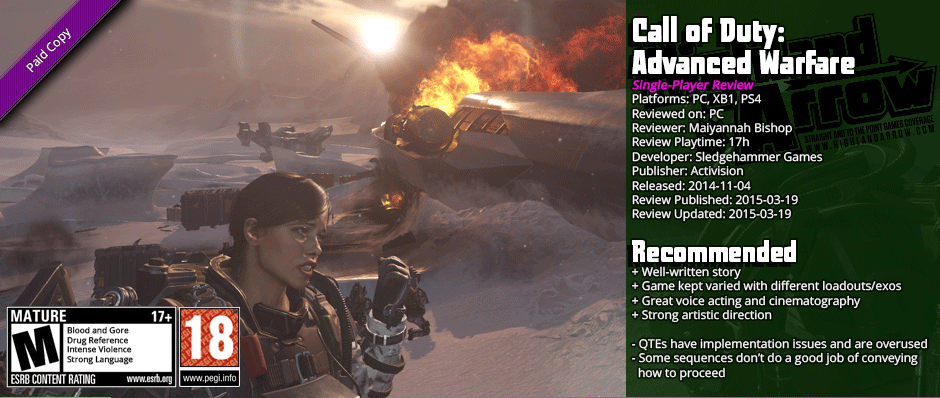

Editor's Note: Since the COD:AW single-player and multi-player modes are functionally often quite different experiences and sets of mechanics, we have divided the review into a review of the single-player, and one of the multi-player.
Call of Duty: Advanced Warfare is a first-person shooter developed by Sledgehammer Games and published by Activision. Modern military shooters have always had a reputation for having rather throw-away at best single-player campaigns, so I must confess I was going into the campaign of Advanced Warfare expecting it to be the dull and poorly-paced tedium that was ultimately the Battlefield 4 campaign for the most part. I can't say it's the game I have enjoyed the most, but Advanced Warfare is certainly the one that has blown away my expectations the most.
A well-written if generic story drives the campaign
The story on offer is a well above-average quality affair with a decent tempo and characters with believable personalities and responses. The game puts you into the combat exo-suit of Jack Mitchell, a US Marine sent to deal with an escalating conflict in Korea as the North invades. You succeed, but the climax of that conflict comes at a cost, as the protagonist suffers an injury that leaves him missing an arm. The father of a fallen comrade whom was the protagonist's best buddy happens to be the CEO of a private military company called ATLAS Corporation, and he offers you the opportunity to receive a prosthetic robotic arm and serve again - in ATLAS. You accept, and this leads to a rigmarole of different missions and a perhaps cliche and predictable twist that I'm not going to spoil, but it's told in a fairly compelling fashion.
The real standout is the character writing, and each major character gives a good performance of seeming deeper than the typical cliches and that they have more going on than just the plot. Probably the thing I enjoyed the most in that regard is that even the eventual antagonist is someone whose motivations are discernable and seem very real: you can see what lead to his actions and made him believe as he did (here be the vague I'm-avoiding-spoilers dance). They each seem to have their own mild arcs as well, though they're nothing too complex.
Brilliant voice-acting helps those characters find the next level
Sledgehammer game employs a mixed cast of big and small names that all deliver for the most part, with the performances from merely good to actually pretty excellent. Kevin Spacey in particular displays an incredible talent and range in the character of Johnathan Irons, the aforementioned father of the protagonist's deceased army buddy, with some other standouts being Gideon Emery playing a namesake character whom is one of your primary fellow soldiers in ATLAS and manages to keep the character's "close to the chest" sort of mentality seem real and not simply paranoia. Nonetheless, there isn't really any performance I could point at as awful in any real way, and what isn't stellar in the voice acting is merely "good". I think it's probably safe to say that if that's the worst i can level at them, the game hasn't done poorly for itself.
The missions are kept varied and yet coherent,
introducing new challenges and gameplay elements at a good clip
Variety, as they say, is the spice of life, and the problem with many of Call of Duty's peers, and indeed often with itself as a series, is the gameplay itself remains very samey, just continual corridors or areas you shoot a bunch of dudes in, before proceeding to the next one and shooting more guys. Advanced Warfare avoids that trap, with a variety of interesting tech toys and accompanying mechanics as situations warrant, and in a particularly shrewd design decision they're usually more than one way to advance through each of the section, allowing you to kind of approach it how you like - from drone strikes, RPG strikes, mobile cover drones, or just shooting through things as you will.
The levels themselves also vary quite a bit as well in terms of pace, some that are slower and more methodical, while others as frantic and heart-pumping chases. The thing that stood out the most to me with these is definitely how three-dimensional and varied these levels are - they may not be as large as some other games' sprawling scenery, but they never felt confined, because there were always multiple paths through the level, and not just in 2 dimensions. I spoke in the multi-player review how much the vertical combat and the quickness of pace changed the game, and it's been capitalised on soundly in the in campaign. Whereas some of the level design in multi-player was weak, every single mission in the campaign is strong in terms of that design - beautiful and well-realised, additionally.
That level design does have its drawback however, in that in some of the more frantic levels, it can be easy to get turned around in and lose sight of how to progress in the level; indeed, that is often why designers keep the level design quite simplistic. I suppose whether it affects you or not is personal and whether it bothers you subjective, so what I'll say in this regard is that I feel that it's a tradeoff that pays off - instead of feeling like closed in spaces all over, it rather feels like open spaces where it should, and that mobility certainly helps.
Reliance on quick-time events is the main thing that diminishes the story
I had to give a long think on this subject actually, because I'm of two minds of the quick-time events in Advanced Warfare. On one hand after the absolute onerous exposition dump and scripted sections of Battlefield 4, so I can certainly understand the game wanting to have a way to keep the player involved. On the other hand, I am generally not a fan of quick-time events, as I feel they are very lazy and simplistic game mechanic. To be fair to Advanced Warfare, for the most part the QTEs come expectedly, and they're used to keep you in the action, which is assuredly a plus. However, as the campaign goes on, they start to feel tired, and a little more like they are filler, and the sequence at the end of the game was a particular cactus in my arse in that regard, requiring basically perfect execution and not really signposting how you are supposed to proceed.


